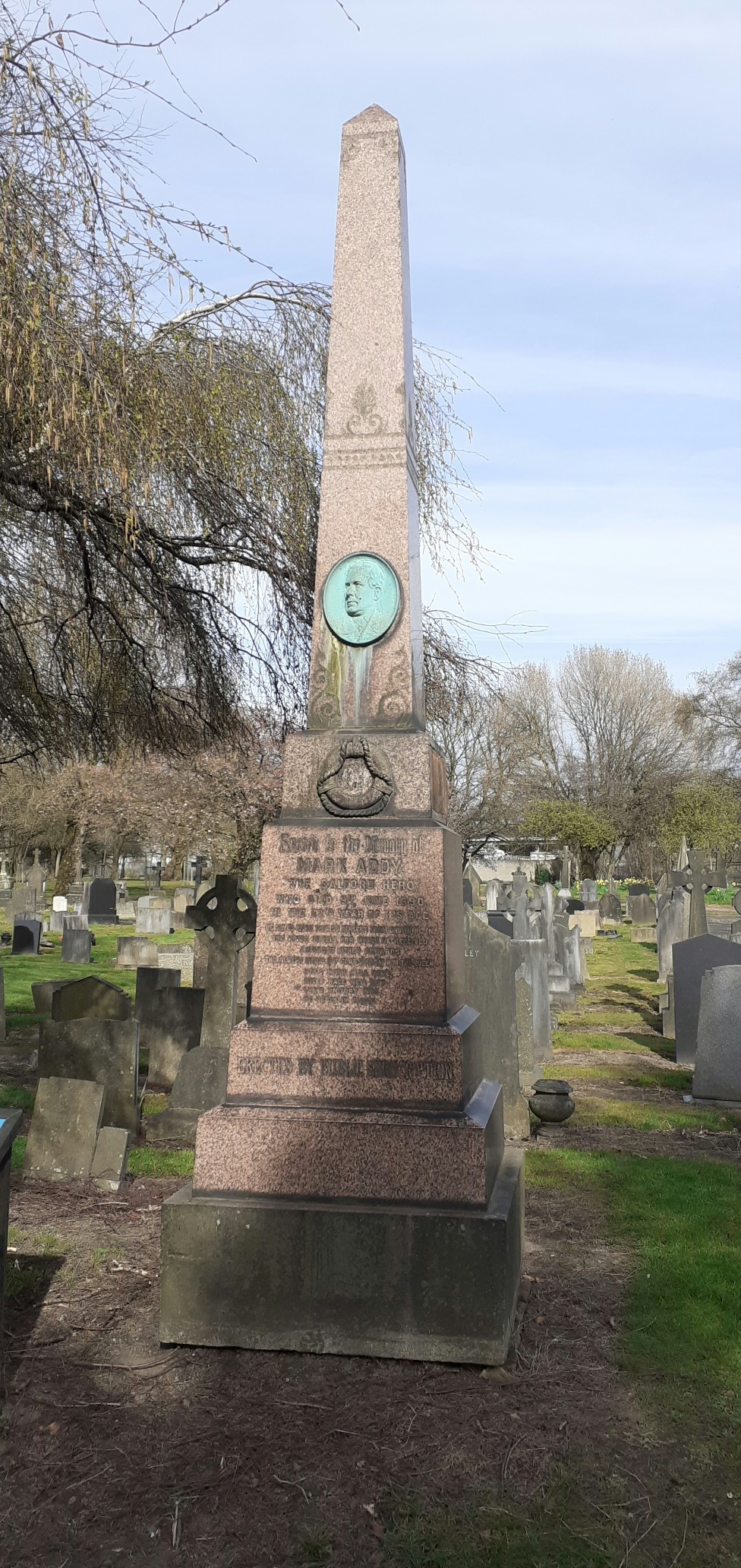b. 1838 Manchester, Lancashire. d. 09/06/1890 Salford, Manchester.
DATE OF AM ACTION: 1853-1878 Salford, Lancashire.
Addy was born in 1838 at 2, Stage Buildings, The Parsonage, an Italianate-style tenement on the banks of the River Irwell near Blackfriars Bridge in Manchester, Lancashire. His father was a boatman, also named Mark Addy, and young Mark assisted him with the family boat-hire business on the river. At the age of 13, Addy rescued one of his friends, John Booth, who had fallen into the Irwell, which ran along the side of his house. Although Mark was himself unable to swim he effected the rescue by wading out up to his chin and pulling the lad ashore. The same boy was rescued by Addy some time later, when he fell into a pool of deep water, but this time Mark floated out on a plank to rescue him.
In his teens Addy learned to swim at Greengate Baths in Salford, and over the next few years became an expert swimmer. He also became a proficient oarsman and, in addition to various successes at local regattas, he beat David Coombes (son of champion sculler, Robert Coombes) in the Thames Championship for £200, and Ted May (author of Ted May’s Useful Little Book) over the same course for £100. He was the head of the famous “Colleen Bawn” crew, who were so named when the proprietor of Queen’s Theatre in Manchester gave a prize, on condition that the winning crew became known by the name of his latest theatre production. After marrying, Mark moved across the river to Ordsall in Salford and became the landlord of the Old Boathouse Inn in Everard Street off Ordsall Lane, but due to its close proximity to the river, he continued to carry out a series of rescues. Although in Mark’s youth the river was relatively clean, as the Industrial Revolution progressed it became more and more polluted, and indeed when the Suez Canal was opened in 1869, the Irwell was jokingly renamed the “Sewage Canal”. However, the increasingly poisonous condition of the river did not seem to deter him from plunging in at a moment’s notice:
In 1872 or 1873 a drunken and mentally unstable woman threw herself in the river in an attempt at suicide. Due to her struggles to fight him off, Mark was almost drowned himself, but despite the cries of onlookers to leave her and save himself, he subdued her and brought her ashore.
On another occasion Addy was roused from his sleep by a boatman who informed him that a woman was drowning in the river. Rushing out in his night-clothes, he rowed out to the woman but was unable to get her into the boat as she weighed over 17 stones (238 lbs./108 kg), so, holding her head out of the water with one hand, he rowed the boat to the bank with the other.
He was presented with the Albert Medal, First Class, by the Mayor of Salford, Alderman Robinson, on behalf of Queen Victoria in the large assembly room of Salford Town Hall in Bexley Square in June 1879. On Whit Monday, 1889 Addy was watching a procession of children, when he heard a cry that a boy had fallen in the river at the bottom of Factory Lane. He made his way to the place and jumped into a particularly sewage-laden stretch of water to save the boy. Although the rescue was successful, according to an 1890 obituary, “he laid the foundation of an illness that day which eventually gained the mastery of his powerful, well-knit frame” and he died of “consumption” (tuberculosis) on 9 June 1890.
Not long after his death it was decided that a memorial should be erected and, in May 1891, 1,000 people attended the unveiling of the monument in Weaste Cemetery, Weaste, Salford where he was buried. The monument consisted of a polished red granite obelisk rising from a stepped base. On the front was inscribed:
Sacred to the memory of Mark Addy, the Salford hero who died 9 June 1890 in the 52nd year of his age. He saved more than 50 persons from drowning in the River Irwell, for which he received amongst other rewards, the Albert Medal (1st class) from H.M. the Queen. Life’s work well done, life’s races well won. He rests in peace. Erected by public subscription.
AM CITATION:
THE Queen has been graciously pleased to confer the “Albert Medal of the First Class” on—
MARK ADDY, of Salford.
Statement of the case of MARK ADDY, to whom the Albert Medal of the First Class has been granted in recognition of his repeated acts of heroism in saving life from drowning in the River Irwell. MARK ADDY, a well-known oarsman and sculler, has resided all his life on the banks of the polluted River Irwell; his father and brothers having followed the trade of Boat Builders. During a period of about twenty-five years, he has, under circumstances of imminent peril, both from the violence of the river and the pestilential nature of its waters, saved no fewer than six-and-thirty lives, several of the cases having occurred subsequently to the date of the creation of the said Order. For his heroic efforts and conspicuous gallantry, he has, at various times, received the following distinctions :—
The Bronze Medal of the Royal Humane Society.
The Silver Medal of the Salford Humane Society.
The Gold Medal of the Salford Humane Society.
An illuminated Address setting forth his Badges of Honour from the Salford Humane Society.
A purse of 200 guineas and an illuminated Address from the inhabitants of Salford.
BURIAL LOCATION: WEASTE CEMETERY, SALFORD, LANCASHIRE.
LOCATION OF MEDAL: SALFORD MUSEUM AND ART GALLERY, SALFORD.
Acknowledgement:
Kevin Brazier – Image of the Addy Grave






